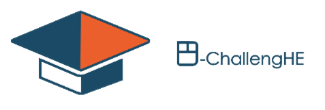

This Guide is developed within the WP5 of the Erasmus+ project ”Digital Challenge in Higher Education” (2022-1-IT02-KA220-HED-000087029).
Chapter 1 Digital technologies in education – An overview
1.3. Digital competences of students, a key competence for academic and professional success
1.3. Digital competences of students, a key competence for academic and professional success
As the world becomes increasingly reliant on digital technologies, the development of digital competence among students has emerged as a crucial priority in the field of education. This competence not only impacts academic performance but also plays a significant role in the preparation for a competitive labour market, where proficiency in digital tools is often a determining factor in an individual's employability and career advancement, highlighting the necessity of integrating information and communication technologies and digital competence development into educational curricula and processes (Rambousek et al., 2015; Jurs & Bethere, 2020).
The DigComp framework, a comprehensive model developed by the European Commission, provides a clear definition of digital competence, identifying 21 competences in five key areas: information and data literacy, communication and collaboration, digital content creation, safety, and problem-solving (in 2.2 version). These areas encompass a wide range of skills, from information retrieval and management to effective communication and the ability to create and manipulate digital content. The mastery of these skills is not only essential for academic success but also crucial for navigating the demands of the modern workforce, where the ability to leverage digital technologies is a fundamental requirement (Fraile et al., 2018; Rambousek et al., 2015).
The framework has been adapted for various contexts, including primary and secondary education, consumers, and educators, becoming a reference for digital competence initiatives across Europe and beyond. Research has explored its application in K-12 and in higher education, and its potential for measuring digital skills (e.g. Ivanović & Simovíc, 2020). The framework continues to evolve, with updates addressing new vocabulary and streamlined descriptors, making it a valuable tool for understanding and developing digital competence in Europe. Maybe the most important is that the DigComp framework emphasizes the importance of continuous learning and adaptation as digital technologies evolve, indicating that lifelong learning is vital for individuals to maintain their relevance in an ever-changing job market and society at large, thereby reinforcing the need for educators to create environments that foster the development of digital competence.
Existing research highlights the significant impact of digital competence on academic achievement, revealing that students equipped with robust digital skills tend to perform better in their studies and are more likely to engage in collaborative learning experiences, which are increasingly integral to modern education practices, thus under scoring the importance of integrating digital competence development into educational curricula (Zulkifli et al., 2023; Anthonysamy, 2022). Moreover, trans-national studies indicated a perceived gap between the digital competency needs of the labour market and the actual skills possessed by students (Kim & Park, 2023; United Nations ITU, 2020; Goger et al., 2022), stressing the need for educational institutions to adopt situated and problem-based learning methodologies that promote the effective acquisition of these crucial skills.
Therefore, the cultivation of digital competence among students is a crucial endeavour that extends beyond the realm of academic performance and into the realm of professional development and lifelong learning. This focus on digital skills is particularly relevant in an era where technology and innovation drive economic growth and societal advancements, necessitating that educational frameworks not only address current competencies but also anticipate future demands in the labour market, ultimately preparing students for a dynamic and evolving landscape of professional opportunities. (González et al., 2023; Gómez-Pablos et al., 2022; Rambousek et al., 2015; Cook et al., 2023). Moreover, the rapid expansion of digital technologies highlights the urgent need for educational institutions to prioritize the systematic development of both students' and teachers' digital competencies, ensuring that they are equipped to thrive in an increasingly digital world, where the ability to adapt and utilize emerging technologies is a critical determinant of personal and professional success. This imperative aligns with the recognition that digital literacy is a requirement for success in a globalized society, as educational stakeholders increasingly invest in digital tools and resources that can enhance teaching and learning experiences, reinforcing the idea that effective use of technology is essential for academic and professional achievement.
» Provide feedback for this chapter: https://forms.gle/tNyWC1HYMsP46t6WA
« Get back to main page: digital-pedagogy.eu/Guidelines
An open access guide. A perfectible product, for an evolving reality.
You can use the form available on this page to provide feedback and/ or suggestions.
For social annotations on any chapter, you can use Hypothesis or any other similar tool.
You can also send direct feedback to: olimpius.istrate@iEdu.ro | +40 722 458 000
Guidelines for online and blended learning
Available online: https://digital-pedagogy.eu/Guidelines
Full pdf version to download: Guidelines (version 6)
The Romanian partner in D-ChallengHE project in charge with WP5 is
the Institute for Education (Bucharest): https://iEdu.ro
Contact: office@iEdu.ro